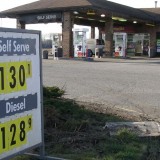With the price of oil
soaring in recent weeks, politicians around the world are scrambling
to react. The price of the benchmark ‘Brent’ crude oil has
increased by almost 90%
in just 12 months, to around $115 a barrel. Now some
speculators are betting that the price is headed towards $200
a barrel, which would spell global economic chaos.
In Spain, the
government has already moved to reduce the highway speed limit and
lower train fares to save fuel. In the UK, the Conservative coalition
government was proposing to increase the speed limit but is now
suddenly reversing course and looking to take sudden action to cut
oil consumption. According to the Observer,
UK energy secretary, Chris Huhne, says they don’t have much choice.
“Getting off the oil hook is made all the more urgent by the
crisis in the Middle East. We cannot afford to go on relying on such
a volatile source of energy.” The problem for the UK government
is that they were counting on cheap oil, and made no preparation for
anything else.
The fact is that our
governments were warned about the potential for a destructive cycle
of oil price spikes and economic crashes years ago. For example in
the wake of the 2004 oil price spike, the US Department of Energy’s
‘Hirsch
Report’ warned of exactly this likelihood. Hirsch
recommended an immediate crash program to reduce US dependence on
oil, noting that even 20 years would be a tight time frame to make
the necessary changes.
In 2005, the
International Energy Agency published Saving
Oil in a Hurry which focused on emergency
measures that could be taken to rapidly reduce transportation oil
consumption with some advance preparation. Recommended measures
include having plans to quickly create networks of bus and cycling
lanes. But it seems that most governments are not prepared, and are
now flailing about instead of implementing plans.
In BC, governments are
still acting as if oil was going to be cheap and plentiful forever.
Instead of taking logical steps to reduce oil dependency and protect
families from oil price shocks, the Campbell administration has spent
more and more on road and freeway expansions. For example, according
to Transport
Canada, in 2008/2009 the BC provincial government
spent over $2.2 billion on roads and Bridges, up from $1.2 billion in
2001/2002. Much of this was spent on roadway expansions. In
contrast, the provincial government reported spending only $660
million on transit and nothing on BC railways.
Some of these roadway
expansion projects, such as the Golden Ears and Port Mann freeway
bridges, are supposed to be paid for by tolls. But even before the
most recent oil price spike, traffic and toll revenue was far below
what is needed to break even on the Golden Ears Bridge so TransLink
funds have been diverted from transit to pay for a mostly empty
freeway bridge. The new Port Mann Bridge and freeway expansion
represents $3.1 billion dollars that could have been invested in
transportation for the future such as electric
trains, light rail and trolley buses.
The Port
Authority recently restarted plans to build another
container terminal on the environmentally sensitive
Roberts Bank in Delta, on the assumption that international trade
will increase drastically in the coming decades. Our ports have a
large amount of excess capacity after Port Metro Vancouver recently
increased capacity at Deltaport by 50 percent and a new container
port was opened in Prince Rupert. The director of SFU’s urban
studies program, Anthony Perl, maintains that with
increasing oil prices long-distance trade
will decline in the future rather than increase.
It is time to admit
that the age of cheap and easily accessible oil is over. The
remaining oil and petroleum gas is largely ‘unconventional’
supplies such as the tar sands. The cost of production of these
sources is high, but the environmental and social costs are even
greater concerns. For example, much of the gasoline and diesel we
burn in BC is now produced from tar sands bitumen – a process that
uses huge amounts of petroleum gas. Much of the gas burned in the tar
sands comes from BC and is extracted by hydraulic
fracturing or ‘fracking‘ which result in
widespread water contamination.
The problem is not only
that our politicians are not prepared to make the changes needed to
overcome our excessive oil dependence. It is also that as soon as the
oil price roller coaster heads down hill again, they will once again
try to convince themselves that nothing significant has changed.
Like with global
warming, our leaders are mainly not prepared to lead. Ordinary people
are going to have to propose real solutions and oppose the most
destructive megaprojects our politicians dream up – such as the
North and South
Fraser Perimeter Road freeways.


I sure wish those who have valid reasons for not wanting to pave paradise would dump both the “greenhouse gases change climate” meme along with the idea that the world is running out of cheap energy. The truth is the Sun has the greatest influence on climate.
http://www.corbettreport.com/episode-177-its-the-sun-stupid/
and the oil companies have been saying we have only 40 years worth of oil for the last 60 years in order to justify the “Oil Depletion Allowance” tax break in the US.
Petroleum and natural gas are produced by the Earth and have nothing to do with dinosaurs.
http://www.gasresources.net/Introduction.htm
The “age” of cheap oil is over only for the time being, probably just until the middle class disappears and the world is divided into the Ultra Rich and the rest of us.
BTW, the IMF and the World Bank want 2% of GDP from EVERY country in the UN to help poor countries adapt to climate change. The money will be collected by the IMF and dished out….at interest…by the World Bank! Canada has pledged $10 Billion to the Bankster Fund.
http://statismwatch.ca/2010/03/31/britain-pushes-for-new-climate-talks-imf-and-global-taxes-to-figure-into-wealth-redistribution-scheme/